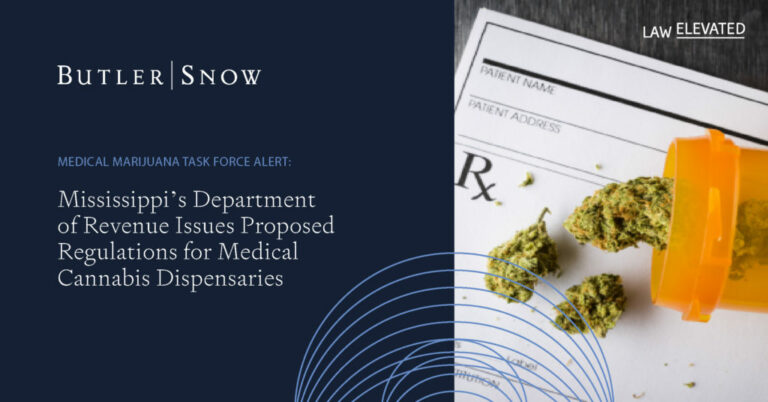On April 15, 2022, the Mississippi Department of Revenue (“DOR”) released its proposed regulations governing cannabis dispensaries in Mississippi. These regulations set forth the requirements of the application process to become a licensed dispensary as well as other requirements for operations, security, marketing, storage and dispensing, transportation, and record retention. While much of the language tracks that of the Mississippi Medical Cannabis Act (the “Act”), the regulations provide some answers to existing questions for those interested in Mississippi’s new medical marijuana industry.
The regulations confirm that there is no requirement that dispensaries be owned by Mississippi residents as is required for cannabis cultivation and processing facilities. They further define “economic interest”—a term used in the Act to limit ownership in cannabis cultivation facilities, cannabis processing facilities, and dispensaries—to mean “holding an ownership interest as a sole proprietor, partner, member, limited partner, stockholder owning at least 10% of available stock, or as any other type of interest that entitles the individual or entity to regular payments for amounts based on a percentage of revenue derived from the sale of cannabis or cannabis products in any licensed dispensary.” Notably, exceptions are made for the following:
- Any investment that the investor does not control in nature, amount or timing, including mutual funds, group investments, etc.;
- Financial institutions that have provided a loan to the dispensary where the repayment amounts for the loan are regular flat fee payments;
- Operators under management agreements where the fee paid to management company is a flat monthly rate or is a percentage fee equal to less than 10% of the monthly gross revenue of the dispensary; and
- Landlords that are receiving flat monthly rate lease payments from the dispensary.
Any management agreements for dispensaries must also be approved by the DOR prior to their being effective.
The regulations also set forth the various information and documentation required for dispensary applications, including: names and other required information for all individuals and legal entities who are applicants; a map of the premises; an operating plan; proof of compliance with any local license, permit, or zoning restrictions; proof of authorization to occupy the property; a sales tax permit; and fingerprint cards for all individuals with an economic interest in the dispensary, including the individual owners of any entity with an economic interest in the dispensary. The operational plan must also include a security plan and meet with other requirements in the regulations regarding security, employee qualifications, and record-keeping.
The regulations further reiterate the Act’s requirement that no dispensary may be within 1,500 feet of another dispensary as measured from the applicant’s “main point of entry,” and provide a definition of “main point of entry” as well as specific instructions for measurement. In the instance two applicants both seek to open dispensaries within 1,500 feet of one another, the first applicant to be issued a license will be controlling, thus incentivizing those applying for dispensary licenses in high-traffic areas to do so correctly the first time.
Finally, those wishing to open a dispensary should also be aware of a recent Mississippi Attorney General Opinion addressing the regulatory power of municipalities and counties to enact zoning ordinances to regulate commercial zones in which dispensaries and other cannabis facilities can be located. The Opinion confirms that a municipality may designate specific types of commercial zones in which medical cannabis dispensaries, research facilities, and testing facilities may operate. Cities may further regulate the time, place, and manner of operations so long as their ordinances are in line with the mandates of the Act and do not make “impracticable” the operation of such facilities. While the DOR’s regulations as proposed recognize pursuant to Chapter 18, Section 104 that a local government may alter—and thus control—the business hours applicable to a dispensary, the Opinion’s finding that a municipality may adopt an ordinance or regulation requiring a greater distance between dispensaries than the 1,500-feet requirement stated in the Act will necessitate quick action on behalf of many dispensary applicants.
The proposed regulations are available on the Department of Revenue’s website and will be available for review and public comment through April 29, 2022.
